Celebrate Hispanic Heritage Month with Howe Library. See our latest Books Spotlight for fiction, nonfiction, English, and Spanish language books featuring Hispanic and Latinx voices. Be sure to visit our display on the first floor of Howe Library for even more books!
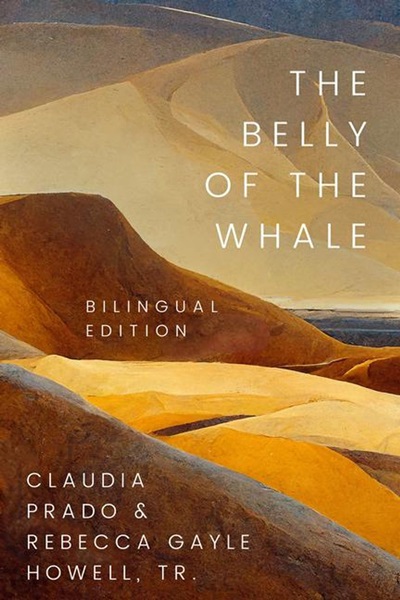
El interior de la ballena = The belly of the whale by Claudia Prado
A novel in verse, presented in Spanish and English, that creates a poetics of rural Patagonia.
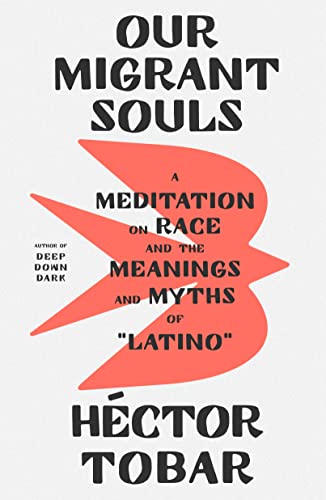
Our migrant souls : a meditation on race and the meanings and myths of "Latino" by Héctor Tobar
"Latino" is the most open-ended and loosely defined of the major race categories in the United States. Our Migrant Souls: A Meditation on Race and the Meanings and Myths of "Latino" assembles the Pulitzer Prize winner Héctor Tobar's personal experiences as the son of Guatemalan immigrants and the stories told to him by his Latinx students to offer a spirited rebuke to racist ideas about Latino people. Our Migrant Souls decodes the meaning of "Latino" as a racial and ethnic identity in the modern United States, and seeks to give voice to the angst and anger of young Latino people who have seen Latinidad transformed into hateful tropes about "illegals" and have faced insults, harassment, and division based on white insecurities and economic exploitation.
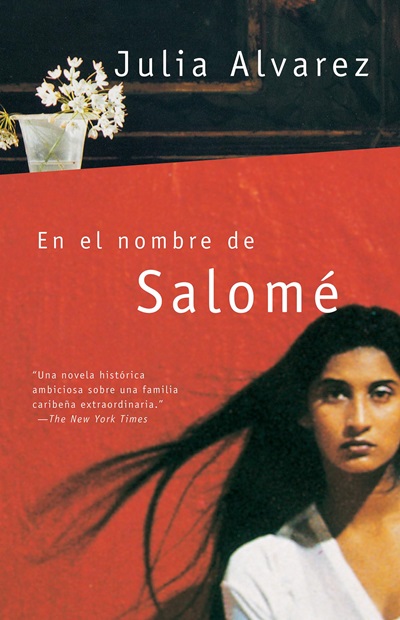
En el nombre de Salomé by Julia Alvarez *Vermont Author*
En el verano de 1960, Camila Henríquez Ureña está a punto de viajar desde Poughkeepsie a Cuba para unirse a la revolución de Fidel Castro. Como hija de Solomé Ureña, la poeta revolucionaria dominicana del siglo XIX, el activismo es parte de la herencia de Camila. Sin embargo, también conoce la confusión del exilio y una dolorosa curiosidad por la madre que nunca conoció. Ahora, mientras retoma el legado de su madre, profundiza en los hechos públicos de la vida de su madre y reconstruye la historia de la Solomé privada y, por tanto, su propia historia.
translation: It the summer of 1960, Camila Henríquez Urena is about to travel from Poughkeepsie to Cuba to join Fidel Castro's revolution. As the daughter of Solomé Urena-the 19th -century revolutionary Dominicana poet-activism is part of Camila's inheritance. Yet she also knows the confusion of exile and a painful curiosity about the mother she never knew. Now, as she takes up her mother's legacy, she delves behind the public facts of her mother's life and pieces together the story of the private Solomé-and thus her own story.
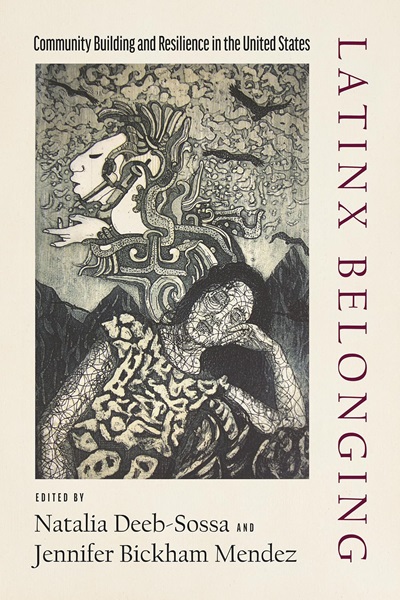
Latinx belonging : community building and resilience in the United States edited by Natalia Deeb-Sossa and Jennifer Bickham Mendez
What does it mean to be Latinx? This pressing question forms the core of Latinx Belonging, which brings together cutting-edge research to discuss the multilayered ways this might be answered. Latinx Belonging is anchored in the claim that Latinx people are not defined by their marginalization but should instead be understood as active participants in their communities and contributors to U.S. society. The volume's overarching analytical approach recognizes the differences, identities, and divisions among people of Latin American origin in the United States, while also attending to the power of mainstream institutions to shape their lives and identities. Contributors to this volume view "belonging" as actively produced through struggle, survival, agency, resilience, and engagement. This work positions Latinxs' struggles for recognition and inclusion as squarely located within intersecting power structures of gender, race, sexuality, and class and as shaped by state-level and transnational forces such as U.S. immigration policies and histories of colonialism. From the case of Latinxs' struggles for recognition in the arts, to queer Latinx community resilience during COVID-19 and in the wake of mass shootings, to Indigenous youth's endurance and survival as unaccompanied minors in Los Angeles, the case studies featured in this collection present a rich and textured picture of the diversity of the U.S. Latinx experience in the twenty-first century.

Alma and how she got her name by Juana Martinez-Neal
When Alma Sofia Esperanza José Pura Candela asks her father why she has so many names, she hears the story of her name and learns about her grandparents.
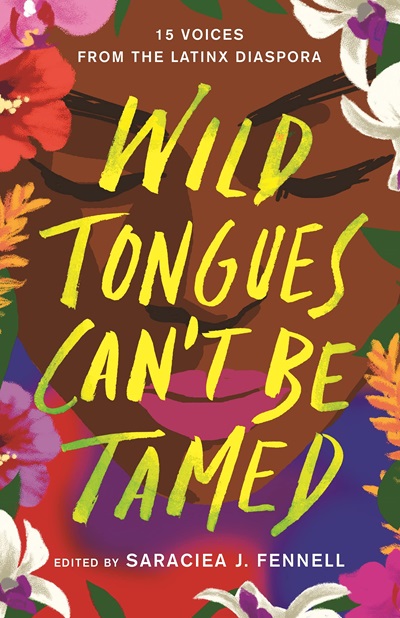
Wild tongues can't be tamed : 15 voices from the Latinx diaspora edited by Saraciea J. Fennell
In Wild Tongues Can’t Be Tamed, bestselling and award-winning authors as well as up-and-coming voices interrogate the different myths and stereotypes about the Latinx diaspora. These fifteen original pieces delve into everything from ghost stories and superheroes, to memories in the kitchen and travels around the world, to addiction and grief, to identity and anti-Blackness, to finding love and speaking your truth. Full of both sorrow and joy, Wild Tongues Can't Be Tamed is an essential celebration of this rich and diverse community.
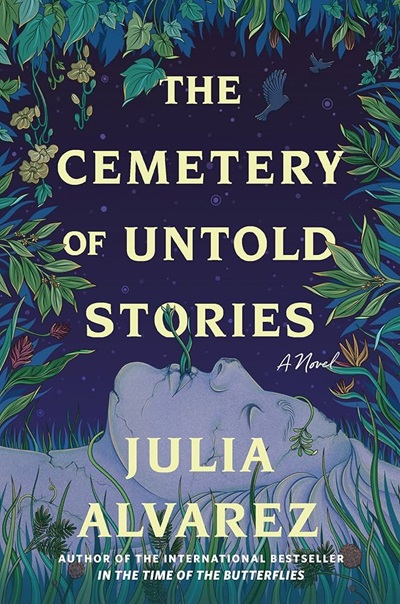
The cemetery of untold stories : a novel by Julia Alvarez. *Vermont Author*
When celebrated writer Alma Cruz inherits a small plot of land in the Dominican Republic, she turns it into a place to bury her untold stories--literally. She creates a graveyard for manuscript drafts and revisions and the characters whose lives she tried and failed to bring to life and who still haunt her. Alma wants her characters to rest in peace, but they have other ideas, and the cemetery becomes a mysterious sanctuary for their true narratives.

Dominicana by Angie Cruz
Fifteen-year-old Ana Canción never dreamed of moving to America, the way the girls she grew up with in the Dominican countryside did. But when Juan Ruiz proposes and promises to take her to New York City, she must say yes. It doesn't matter that he is twice her age, that there is no love between them. Their marriage is an opportunity for her entire close-knit family to eventually immigrate. So on New Year's Day, 1965, Ana leaves behind everything she knows and becomes Ana Ruiz, a wife confined to a cold six-floor walk-up in Washington Heights. Lonely and miserable, Ana hatches a reckless plan to escape. But at the bus terminal, she is stopped by César, Juan's free-spirited younger brother, who convinces her to stay. As the Dominican Republic slides into political turmoil, Juan returns to protect his family's assets, leaving César to take care of Ana. Suddenly, Ana is free to take English lessons at a local church, lie on the beach at Coney Island, dance with César at the Audubon Ballroom, and imagine the possibility of a different kind of life in America. When Juan returns, Ana must decide once again between her heart and her duty to her family. In bright, musical prose that reflects the energy of New York City, Dominicana is a vital portrait of the immigrant experience and the timeless coming-of-age story of a young woman finding her voice in the world.
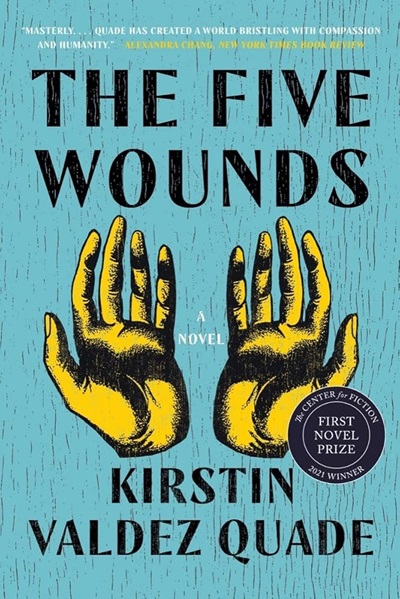
The five wounds : a novel by Kirstin Valdez Quade
It's Holy Week in the small town of Las Penas, New Mexico, and thirty-three-year-old unemployed Amadeo Padilla has been given the part of Jesus in the Good Friday procession. He is preparing feverishly for this role when his fifteen-year-old daughter Angel shows up pregnant on his doorstep and disrupts his plans. Their reunion sets her own life down a startling path. Vivid, tender, darkly funny, and beautifully rendered, The Five Wounds spans the baby's first year as five generations of the Padilla family converge: Amadeo's mother, Yolanda, reeling from a recent discovery; Angel's mother, whom Angel isn't speaking to; and disapproving Tío Tíve, keeper of the family's history. In the absorbing, realist tradition of Elizabeth Strout and Jonathan Franzen, Kirstin Valdez Quade conjures characters that will linger long after the final page, bringing to life their struggles to parent children they may not be equipped to save.
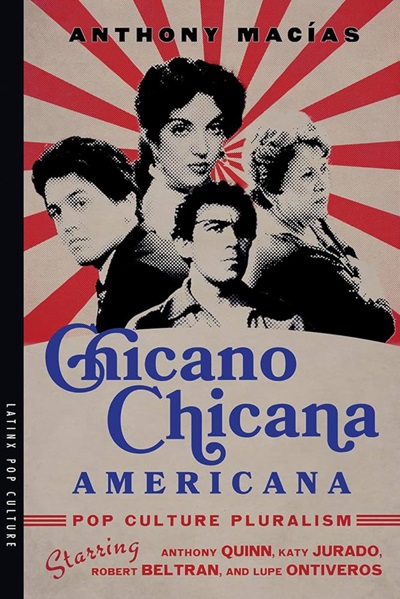
Chicano-Chicana Americana : pop culture pluralism starring Anthony Quinn, Katy Jurado, Robert Beltran, and Lupe Ontiveros by Anthony Macías
Chicano-Chicana Americana is a cultural history of Mexican Americans in film, television, and theater. Each chapter presents an in-depth case study analyzing the lives and creative careers of four underappreciated actors--Anthony Quinn, Katy Jurado, Robert Beltran, and Lupe Ontiveros-to answer the question: How do racially and socio-economically marginalized Latino-Latina subjects contribute to U.S. culture, beyond the black-white binary? Drawing on methods borrowed from cultural studies, Macías argues that these performers, neither assimilationists nor nationalists, expressed a dynamic, complex ethnic identity, created an alternative strategy for how Latinos and Latinas are seen in popular culture, and carved out a space for imagining a polycultural America. These artists altered cinematic representations and audience expectations of ethnic Mexicans by challenging, undermining, and surpassing stereotypes. By documenting their presence in motion picture studio-era movies, and public, network, and cable TV, Chicano-Chicana Americana demonstrates how Chicanas and Chicanos made their mark on Americana.
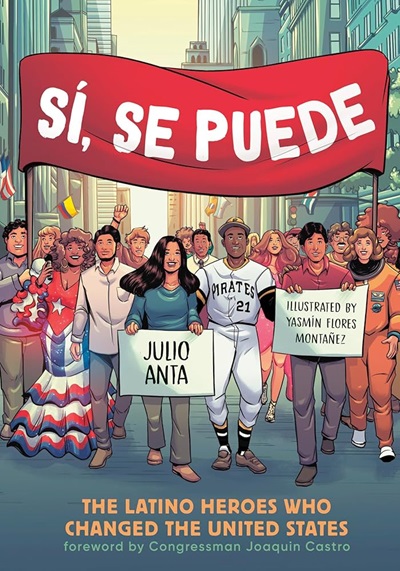
Sí, se puede : the Latino heroes who changed the United States by Julio Anta
From community activism to the halls of government, pop-culture, arts, and beyond, Latinos have shaped every aspect of American life. Nevertheless, these significant figures and their contributions are often left out of our textbooks. Sí, Se Puede, named after the "Yes, We Can" motto of the United Farm Workers, brings Latino history in the U.S. to the forefront. The book follows a group of Hispanic-Americans as they embark on an interactive museum tour to meet Latino heroes they may not have learned about in school. The high tech, immersive exhibit allows the tour group to virtually travel through time, visiting the Hispanic Union soldiers of the Civil War; marching with César Chávez and Dolores Huerta in the farmworkers struggle; going to space with Ellen Ochoa, the first Latina to leave Earth's atmosphere; meeting the youngest woman to ever serve in Congress, Alexandria Ocasio-Cortez; and more. This ensemble of unlikely friends discover the rich history of Latinos in the United States, and gain new insights into their own American experiences.
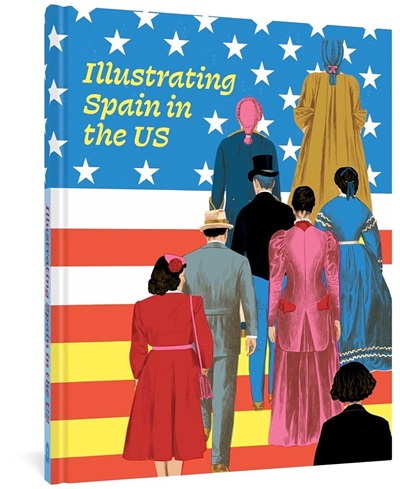
Illustrating Spain in the US editor and curator : Ana Merino ; translator : Marta González-Cutre
A combination of comics and essays sheds light on the rich but often overlooked contributions of Spanish immigrants to the political, cultural, and scientific history of the US.
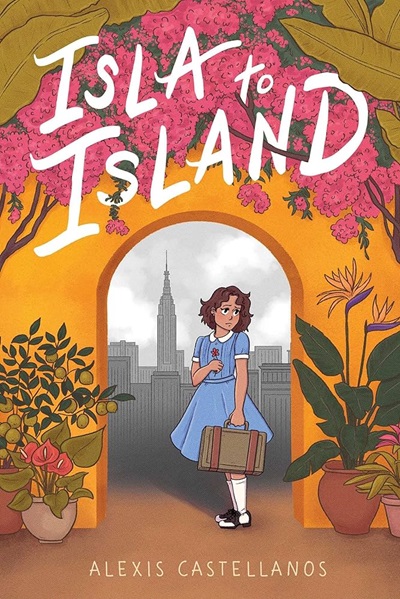
Isla to island by Alexis Castellanos
A wordless graphic novel in which twelve-year-old Marisol must adapt to a new life [in] 1960s Brooklyn after her parents send her to the United States from Cuba to keep her safe during Castro's regime.
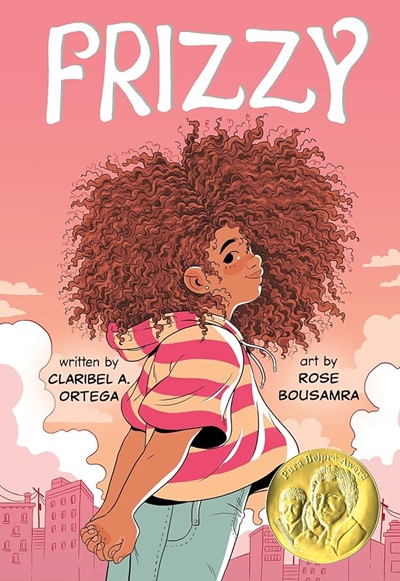
Frizzy by written by Claribel A. Ortega ; art by Rose Bousamra
Marlene loves three things: art, her cool tía Ruby and hanging out with her best friend, Camilla. But according to her mother, Paola, the only things she needs to focus on are school and growing up. That means straightening her hair every weekend so she can have "presentable," "good" hair. But Marlene hates being in the salon and doesn't understand why her curls are not considered pretty by those around her. With a few hiccups, a dash of embarrassment, and the much-needed help of Camila and Tía Ruby -- she slowly starts a journey to learn to appreciate and proudly wear her curly hair.
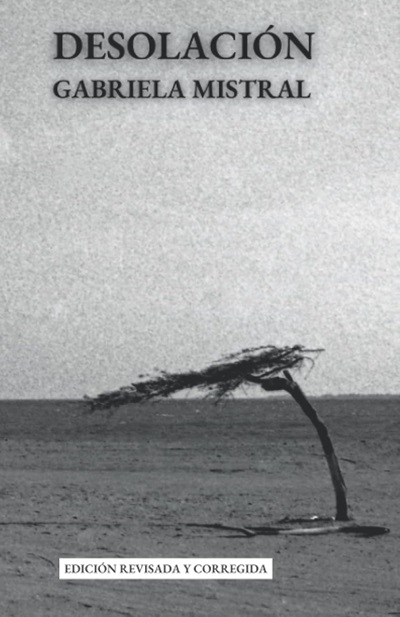
Desolación by Gabriela Mistral ; translated by Inés Bellina, Anne Freeland & Alejandra Camila Quintana Arocho ; featuring 37 poems translated by Langston Hughes
Gabriela Mistral was the first Latin American to receive the Nobel Prize in Literature, which she was awarded in 1945. Mistral has fascinated scholars, writers, and artists, who have tried to piece together the variegated layers of her persona and her "emotionally outspoken verses," as Langston Hughes described them. Sundial House's centenary edition commemorates Mistral's debut anthology, Desolación (1922), edited by Federico de Onís at Columbia University. This bilingual edition, featuring 37 poems translated by Langston Hughes, breathes new life into the Mistral's first anthology and makes available in English an intimate portrait of an ardent observer of life. Desolación is an evocative collection of poems and haunting poetic prose that explore desire, grief, motherhood, childhood, nature, and spirituality with radical sensibility.
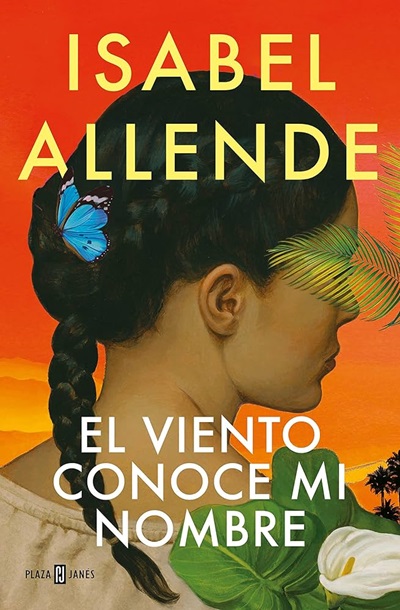
El viento conoce mi nombre by Isabel Allende
Traza el efecto dominó de la guerra y la inmigración en dos niños: Samuel, de cinco años, cuya madre lo mete en un tren Kindertransport desde la Austria ocupada por los nazis a Inglaterra en 1938, y Anita, de siete años, que aborda otro tren ocho décadas más tarde a los EE.UU., donde se separa de su madre.
translation: Traces the ripple effects of war and immigration on two children--five-year-old Samuel, whose mother puts him on a Kindertransport train out of Nazi-occupied Austria to England in 1938, and seven-year-old Anita, who boards another train eight decades later to the U.S., where she is separated from her mother.
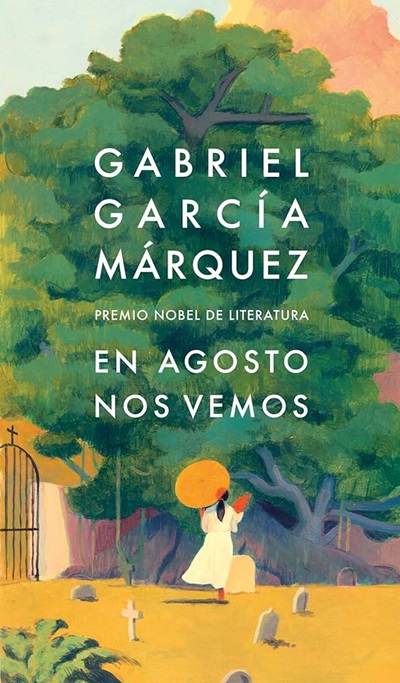
En agosto nos vemos by Gabriel García Márquez
Cada mes de agosto Ana Magdalena Bach toma el transbordador hasta la isla donde está enterrada su madre para visitar la tumba en la que yace. Esas visitas acaban suponiendo una irresistible invitación a convertirse en una persona distinta durante una noche al año. Escrita en el inconfundible y fascinante estilo de García Márquez, En agosto nos vemos es un canto a la vida, a la resistencia del goce pese al paso del tiempo y al deseo femenino. Un regalo inesperado de uno de los escritores más queridos de nuestra lengua.
translation: The extraordinary rediscovered novel from the Nobel Prize-winning author of Love in the Time of Cholera and One Hundred Years of Solitude. Sitting alone beside the languorous blue waters of the lagoon, Ana Magdalena Bach contemplates the men at the hotel bar. She has been happily married for twenty-seven years and has no reason to escape the life she has made with her husband and children. And yet, every August, she travels by ferry here to the island where her mother is buried, and for one night takes a new lover. Across sultry Caribbean evenings full of salsa and boleros, lotharios and conmen, Ana journeys further each year into the hinterland of her desire and the fear hidden in her heart. Constantly surprising, joyously sensual, Until August is a profound meditation on freedom, regret, self-transformation, and the mysteries of love--an unexpected gift from one of the greatest writers the world has ever known.
